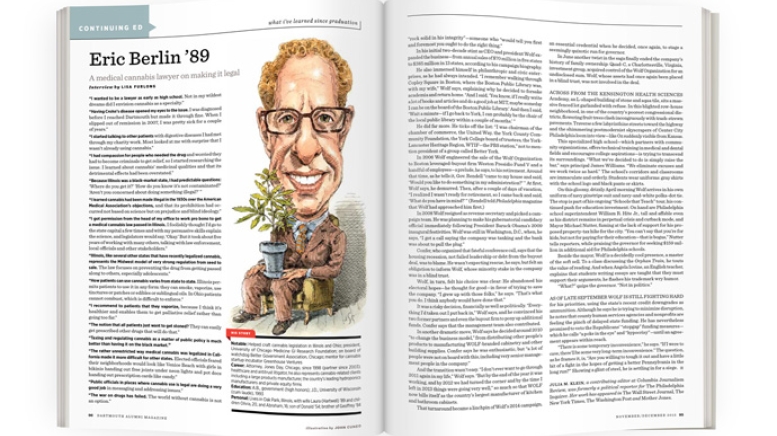Notable: Helped craft cannabis legislation in Illinois and Ohio; president, University of Chicago Medicine GI Research Foundation; on board of watchdog Better Government Association, Chicago; mentor for cannabis startup incubator Greenhouse Ventures
Career: Attorney, Jones Day, Chicago, since 1998 (partner since 2003); healthcare and antitrust litigator, he also represents cannabis-related clients including a large products manufacturer, the country’s leading hydroponics manufacturers and private equity firms
Education: A.B., government (high honors); J.D., University of Wisconsin (cum laude), 1993
Personal: Lives in Oak Park, Illinois, with wife Laura (Hartwell) ’89 and children Olivia, 20, and Abraham, 16; son of Donald ’54; brother of Geoffrey ’84
“I wanted to be a lawyer as early as high school. Not in my wildest dreams did I envision cannabis as a specialty.”
“Having Crohn’s disease opened my eyes to the issue. I was diagnosed before I reached Dartmouth but made it through fine. When I slipped out of remission in 2007, I was pretty sick for a couple of years.”
“I started talking to other patients with digestive diseases I had met through my charity work. Most looked at me with surprise that I wasn’t already using cannabis.”
“I had compassion for people who needed the drug and worried they had to become criminals to get relief, so I started researching the issue. I learned about cannabis’ medicinal qualities and that its detrimental effects had been overstated.”
“Because Illinois was a black-market state, I had predictable questions: ‘Where do you get it?’ ‘How do you know it’s not contaminated?’ ‘Aren’t you concerned about doing something illegal?’ ”
“I learned cannabis had been made illegal in the 1930s over the American Medical Association’s objections, and that its prohibition had occurred not based on science but on prejudice and blind ideology.”
“I got permission from the head of my office to work pro bono to get a medical cannabis law passed in Illinois. I foolishly thought I’d go to the state capital a few times and with my persuasive skills explain the science, and legislators would say, ‘Okay.’ But it took about five years of working with many others, talking with law enforcement, local officials and other stakeholders.”
“Illinois, like several other states that have recently legalized cannabis, represents the Midwest model of very strong regulation from seed to sale. The law focuses on preventing the drug from getting passed along to others, especially adolescents.”
“How patients can use cannabis varies from state to state. Illinois permits patients to use it in any form: they can smoke, vaporize, use tinctures or patches or edibles or sublingual oils. In Ohio patients cannot combust, which is difficult to enforce.”
“I recommend to patients that they vaporize, because I think it’s healthier and enables them to get palliative relief rather than going too far.”
“The notion that all patients just want to get stoned? They can easily get prescribed other drugs that will do that.”
“Taxing and regulating cannabis as a matter of public policy is much better than having it on the black market.”
“The rather unrestricted way medical cannabis was legalized in California made it more difficult for other states. Elected officials feared their neighborhoods would look like Venice Beach with girls in bikinis handing out free joints under neon lights and pot docs handing out prescription cards like candy.”
“Public officials in places where cannabis use is legal are doing a very good job in messaging and addressing issues.”
“The war on drugs has failed. The world without cannabis is not an option.”




